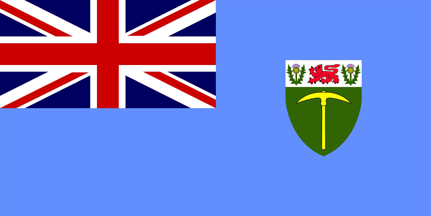
FOTW beschäftigt sich mit der Wissenschaft der Vexillologie (Flaggenkunde).
Alle auf dieser Website dargebotenen Abbildungen dienen ausschließlich der Informationsvermittlung im Sinne der Flaggenkunde.
Wir distanziert uns ausdrücklich von allen hierauf dargestellten Symbolen verfassungsfeindlicher Organisationen.
Last modified: 2015-05-25 by bruce berry
Keywords: rhodesia | southern rhodesia | zimbabwe |
Links: FOTW homepage |
search |
disclaimer and copyright |
write us |
mirrors
 image by Clay Moss, 11 May 2008
image by Clay Moss, 11 May 2008
Other Zimbabwe Historical flags:
See also:
After the breakup of the Federation of Rhodesia and Nyasaland (when Southern Rhodesia joined the British protectorates of Northern Rhodesia and Nyasaland between 1953 - 1963) Northern Rhodesia became the independent republic of Zambia and Nyasaland became Malawi under African leadership during 1964. Rhodesia (having dropped the "Southern") wanted independence on the same lines but the British Government refused on the basis that not enough was being done regarding the political advancement of the African population.
After the demise of the Federation, the question of a distinctive flag for (Southern) Rhodesia again arose and on 08 April 1964 the then Prime Minister, Mr Winston Field, stated in parliament that the new flag of the colony would be "an Ensign with a sky blue background (the same colour as appears on the Air Force flag) with the Union Jack in the top left-hand corner and the Southern Rhodesia badge in the fly". The main motivation for adopting the light blue background, as opposed to the traditional dark blue, was that it was felt that a clear break had to be made from the situation before and during the Federal period, which most white Rhodesians felt very emotional about, particularly their perceived poor treatment by the British government during the dissolution of the Federation.
The flag was raised for the first time on 22 April 1964 by the Minister of Trade, Industry and Development, Mr George Rudland at the official opening of the Central African Trade Fair in Bulawayo. Thereafter it was officially introduced at all Government institutions on 26 May 1964.
Unlike with the previous Southern Rhodesia dark blue and red ensigns used between 1923 and 1953, this version always had the shield placed directly in the fly without a disc.
This
flag continued to be used immediately after the country's Unilateral Declaration
of Independence (UDI) from Britain on 11 November 1965. However, on 11
November 1968 (the third anniversary of UDI), it was replaced by the
Rhodesian flag which symbolised the country's
independence and for the first time in its history did not feature the Union
Jack.
Bruce Berry, 20 Nov 1995, 14 March 1996
The Rhodesian national flag from 08 April 1964 until 10 November 1968,
was in the style of a British ensign with the Rhodesian badge in the fly.
Rather than the dark blue ensign commonly used by Commonwealth countries
or British colonies, such as those used by Australia or
colonial Hong Kong, the field
of the Rhodesian flag was light blue or sky blue, similar to that used
on the Royal Air Force ensign and on the flags of
Fiji and Tuvalu.
Devereaux Cannon, 13 Jan 1998
I wonder how many other countries have
as an official policy the flying of two flags (state flags don't count, neither
does a supra-national flag)?
Anonymous
This practice was followed in the
Federation of Rhodesia and Nyasaland. After the dissolution of the
federation, Rhodesia continued the practice with the Union Jack and the light
blue Rhodesian flag, but ceased doing so with the adoption of the new
green and
white national flag on 11 November 1968.
Devereaux Cannon, 10 January 1998
The only oddity about this situation was that it continued
so late, since in the early days all British dominions flew the Union Jack (as
the primary flag) and the local flag, often side by side. (I use the word
“dominion” here in the pre-First World War sense, meaning a possession of the
British Crown, as opposed to a self-governing member of the Empire, which was
the definition that came into use in the 1920s, and more particularly in the
1930s following the Statute of Westminster, which made the Dominions [capital D]
independent states.) See for instance
South Africa 1910-1928.
Mike Oettle, 22 May 2002
The impression I have is that it was done, to a greater or
lesser extent, only in Australia, Canada,
New Zealand, (Southern) Rhodesia and
the Union of South Africa.
David Prothero, 23 May 2002
In the Rhodesian case, one of the reasons as to why this
came into being was due to the confusion in the 1930s over what was considered
to be the Southern Rhodesia flag. When the Admiralty granted
permission for a Southern Rhodesian dark blue ensign in 1937, this was
specifically stated as being for use OUTSIDE the country only while the Union
Jack remained the official flag of the colony and thus flew within the country.
With the advent of the Federation in 1953, it must be remembered that the UK
Government was an official participating entity in the Federal government
structure (along with the Governments of Southern Rhodesia, Northern Rhodesia,
Nyasaland and the Federal Government - a unique, if somewhat clumsy, 5
administration arrangement), hence the Union Jack remained an "official" flag
along with the Federal flag. Following the dissolution of the Federation at the
end of 1963, the participating territories reverted back to their individual
"colonial" status and Southern Rhodesia continued with the dual flag arrangement
until after UDI in 1965. This "rebellion against the crown" saw the adoption of
a new flag on 11 November 1968 and the dropping of the Union Jack as an official
flag of the country.
Bruce Berry, 23 May 2002
Hosted by: Fanshop-Online.de und Handy-Shop.de
Tip: Handy mit Vertrag